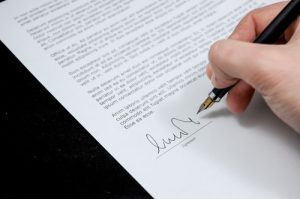 A non-disclosure agreement, also referred to as a confidentiality agreement, is a contract between two parties that states one or more of the involved parties will not disclose private information about a company or an individual.
A non-disclosure agreement, also referred to as a confidentiality agreement, is a contract between two parties that states one or more of the involved parties will not disclose private information about a company or an individual.
There are numerous reasons why a non-disclosure agreement may be put into effect. It often occurs at the end of employment or after a project that involves sensitive information is complete.
It is helpful to have a complete understanding of the purpose of a non-disclosure agreement, how the contract works, and what information may be included before signing or creating one.
How Does a Non-Disclosure Agreement Work?
A non-disclosure agreement is a detailed document that highlights key information about the confidentiality agreement between two or more parties. The most notable elements of a non-disclosure agreement often include:
- What information is confidential
- What information is excluded
- The obligation of parties involved
- The start and end date for the NDA
The non-disclosure agreement highlights the information that is private and must be kept confidential. This may include company passwords, confidential test results, customer and client private information, and various other forms of data (note: these are just examples and there are many reasons a non-disclosure agreement may be created).
The non-disclosure agreement may also highlight the information that is excluded and not considered confidential. This may include information that was already widely known by the public or information that was discovered before or after the party became involved.
Most agreements also highlight the obligation of each party that is involved. For the party that signs the NDA that states they will not disclose the information, it likely means that the party that created the document has the right to seek legal action if the contract is breached.
How Long Do They Last?
 The length of time the non-disclosure agreement remains in effect is also specified in the contract. These terms are subject to negotiation between both parties involved. Some NDAs only require the party to not disclose certain information for a specified amount of time, whereas others may not have an end date.
The length of time the non-disclosure agreement remains in effect is also specified in the contract. These terms are subject to negotiation between both parties involved. Some NDAs only require the party to not disclose certain information for a specified amount of time, whereas others may not have an end date.
This information is important for both parties to understand, and parties who are concerned with the length of time of the non-disclosure agreement should seek to negotiate better terms.
For example, an employee that ends their employment with a company may be asked to sign a non-disclosure agreement. By establishing a reasonable end date for the non-disclosure agreement, the employee can better protect themselves if they are in a situation where they may need to or be in a position to release private information years or decades down the road.
Are They Legally Binding?
A non-disclosure agreement is a legally binding contract; if one of the parties breaks the agreement terms, then they are subject to legal action. There are many ways to breach a contract and violate the terms of the non-disclosure agreement. Of course, verbally communicating confidential information that is included in the agreement is one way, but it does not always have to be an intentional act.
For example, if someone leaves a sheet of company passwords or sensitive information in the library after signing a non-disclosure agreement, and the information ends up in the wrong hands that leads to the data becoming public, then the individual is most likely in violation of the non-disclosure agreement.
The employee-employer relationship is just one that may require a non-disclosure agreement. Other types of legally-binding non-disclosure agreements may also be created between attorneys and clients, doctors and patients, and even between libraries and library members.
What Information is Included in Non-Disclosure Agreements?
 There are an endless amount of reasons why a non-disclosure agreement could potentially be created. Several of the more common reasons for non-disclosure agreements include:
There are an endless amount of reasons why a non-disclosure agreement could potentially be created. Several of the more common reasons for non-disclosure agreements include:
- Protect personal client information a company holds
- Ensure laboratory test results remain private
- Prevent the leak of controversial company information
- Keep future business decisions private
- Protect company passwords after termination
A non-disclosure agreement is typically created to protect the company after an employee leaves the company or finishes a project. This ensures former employees do not use the information to harm the company or its reputation after they leave, which may occur if the employee feels they were wrongfully terminated or begins to work for a competitor.
Contact an Experienced Employment Law Attorney
The Brown Firm has experienced employment law attorneys that are ready to assist you with non-disclosure agreements. If you are an employee that has questions or needs legal assistance with a non-disclosure agreement, then reach out to us today to receive the answers and guidance that you need.

